Podcast Topic: Climate Change, Environment & Food
The Leading Voices in Food
Podcast Topic: Climate Change, Environment & Food
 E185: How and why do households waste food?
E185: How and why do households waste food?
November 2, 2022
Did you know that each year the average American family of four loses $1,500 to uneaten food? What’s more, consumer food waste is the largest category of waste sent to landfills. When food is wasted, so is the land, water, labor, and energy that were used in producing, processing, transporting, preparing, storing and disposing of the discarded food. So why does household food waste and plate waste happen? We have two guests today to help us explore this topic. First, Dr. Roni Neff from Johns Hopkins University. Roni studies wasted food, food system resilience, and climate change through a public health lens. Second, we have Dr. Brian Roe from the Ohio State University. Brian focuses on food waste and behavioral and consumer economics.
Related podcasts: Climate Change, Environment & Food | Food Waste & Implications | Food, Psychology & Neuroscience |
 E179: Investing in Soil Regeneration for Human Health & Environmental Health
E179: Investing in Soil Regeneration for Human Health & Environmental Health
August 31, 2022
Today, we’re speaking with geologist David Montgomery, co-author with Anne Bikle, of a new book called “What Your Food Ate.” Very interesting title. David is professor in the College of the Environment at the University of Washington and earlier had been awarded a MacArthur fellowship. You may already be familiar with him through his acclaimed book called “Dirt: The Erosion of Civilizations.” Dr. Montgomery has long argued that the root of good health begins with dirt, a factor that we ignore at our peril.
Related podcasts: Agriculture & Tech | Climate Change, Environment & Food | Regenerative Agriculture |
 E178: A Call to Invest in Agriculture’s Missing Middle
E178: A Call to Invest in Agriculture’s Missing Middle
August 24, 2022
We’ve done many podcasts on the topic of regenerative agriculture, which is a conservation and rehabilitation approach to farming and ranching that enriches and restores the environment while also producing more nutrient dense food. Today, we are speaking with Anna Aspenson of the Croatan Institute about the need for financial investment in regional food production, and processing infrastructure, such as meat packing, grain milling and malting and produce canning, or even freezing facilities.
Related podcasts: Agriculture & Tech | Climate Change, Environment & Food | Community & Economic Development | Regenerative Agriculture |
 E174: Down to Earth with NC Farm Bureau’s Shawn Harding
E174: Down to Earth with NC Farm Bureau’s Shawn Harding
July 7, 2022
Today, we’re talking with the President of North Carolina Farm Bureau, Shawn Harding. Farm Bureau is the state’s largest farming organization and is often referred to as the voice of North Carolina agriculture. In this interview, we’ll explore the diverse ways this vital association supports North Carolina farmers and growers. I might also say that there are Farm Bureaus in all 50 states, and from what I understand, North Carolina is one of the largest. So it’s a special pleasure to have Shawn with us.
Related podcasts: Agriculture & Tech | Climate Change, Environment & Food | Community & Economic Development | Food Policy | North Carolina | Voice of Farming |
 E171: Vertical Farming in Qatar – Promise & Challenges
E171: Vertical Farming in Qatar – Promise & Challenges
June 16, 2022
Today, we’re exploring an agricultural innovation in the state of Qatar in Western Asia. Qatar is a wealthy, densely populated country located on the Northeast coast of the Arabian peninsula and leads the world in liquified natural gas exports. But the country’s desert climate is harsh and the agriculture there is challenging. That’s where shipping containers, artificial light and vertical farming techniques come into play. Our guest today is horticulturalist Mohamed Hassouna from the Qur-anic Botanic Garden in Qatar. He and his partners at the University of Arizona are developing a shipping container vertical farming model as a way to expand local food production.
Related podcasts: Agriculture & Tech | Climate Change, Environment & Food | Urban Agriculture |
 E167: Muller Shepherding Regenerative and Restorative Agricultural Practices
E167: Muller Shepherding Regenerative and Restorative Agricultural Practices
May 19, 2022
Today’s podcast is part of our Regenerative Agriculture series. I’m speaking with Mark Muller, Executive Director of the Regenerative Agriculture Foundation (RAF). The RAF seeks to foster the economic policy and knowledge conditions that support land stewardship, climate solutions, racial equity, adjust economy, and thriving rural communities.
Related podcasts: Agriculture & Tech | Climate Change, Environment & Food | Regenerative Agriculture |
 E165: North Carolina Youth Food Initiative Brings Young People into Social Transformation
E165: North Carolina Youth Food Initiative Brings Young People into Social Transformation
May 5, 2022
Today, we’re going to explore one way that young people in North Carolina are working to improve their local food system. The Food Youth Initiative is a program based in the Center for Environmental Farming Systems, which is housed at North Carolina State University. Now we’ll be talking with the Program Coordinator, Bevelyn Ukah, and the Program Partner, Ree Ree Wei, of Transplanting Traditions Community Farm.
Related podcasts: Advocacy & Food | Climate Change, Environment & Food | North Carolina |
 E158: CAFOs, Communities, and Alternatives to Industrial Agriculture
E158: CAFOs, Communities, and Alternatives to Industrial Agriculture
February 24, 2022
Are there models for livestock production that support both farmers and communities? Today, we’re going to explore the complex nature of relationships between farmers and nearby communities and the impact of industrial agricultural practices, such as CAFOs, stands for concentrated animal feeding operations, on those relationships. Our guests today are policy advocate Sarah Carden with Farm Action and community organizer Monica Brooks from the Maryland State Commission for Environmental Justice and Sustainable Communities.
Related podcasts: Advocacy & Food | Agriculture & Tech | Climate Change, Environment & Food | Community & Economic Development | Equity, Race & Food Justice | Food Policy |
 E156: Myths About Industrial Agriculture That Affect Us All
E156: Myths About Industrial Agriculture That Affect Us All
February 10, 2022
So there’s a big question out there that’s being asked over and again: do massive multinational corporations have an outsized control of our food system, and what does this mean for all of us? Disruptions in food supply chains recently have highlighted the vulnerabilities of an industrialized agriculture system that according to some does not benefit farmers, farm workers or even consumers. Today, we’re going to explore a new report from the organization Farm Action entitled “The Truth About Industrial Agriculture: A Fragile System Propped Up By Myths and Hidden Costs.” Our guest today is Dee Laninga, senior communications manager for Farm Action.
Related podcasts: Agriculture & Tech | Climate Change, Environment & Food | Community & Economic Development | Food Industry Behavior & Marketing | Food Policy | Voice of Farming |
 E147: Farmer-scientist Measures the Real Benefits of Regenerative Agriculture
E147: Farmer-scientist Measures the Real Benefits of Regenerative Agriculture
November 1, 2021
Today’s podcast is part of our Regenerative Agriculture series of podcasts. We’re talking with agroecologist Dr. Jonathan Lundgren, CEO for Blue Dasher Farm in South Dakota, and also founder and director of the ECDYSIS Foundation. Dr. Lundgren connects the worlds of science and agriculture, and his working regenerative farm is also a scientific research hub.
Related podcasts: Agriculture & Tech | Climate Change, Environment & Food | Regenerative Agriculture | Voice of Farming |

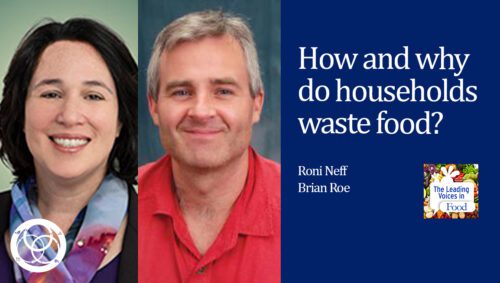 E185: How and why do households waste food?
E185: How and why do households waste food?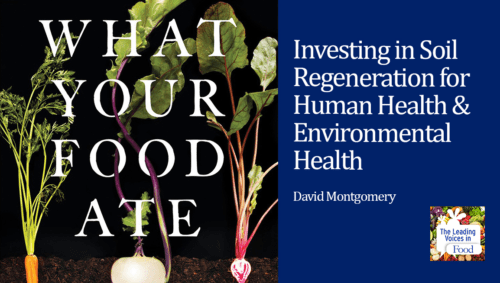 E179: Investing in Soil Regeneration for Human Health & Environmental Health
E179: Investing in Soil Regeneration for Human Health & Environmental Health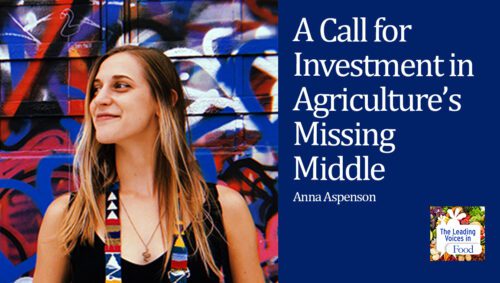 E178: A Call to Invest in Agriculture’s Missing Middle
E178: A Call to Invest in Agriculture’s Missing Middle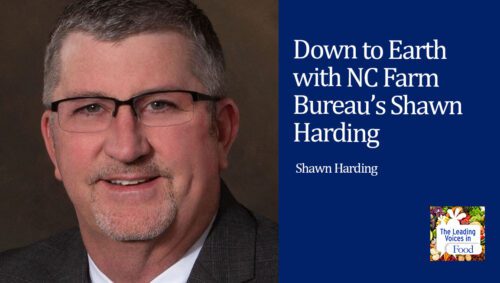 E174: Down to Earth with NC Farm Bureau’s Shawn Harding
E174: Down to Earth with NC Farm Bureau’s Shawn Harding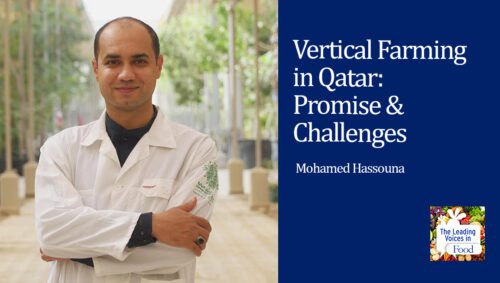 E171: Vertical Farming in Qatar – Promise & Challenges
E171: Vertical Farming in Qatar – Promise & Challenges E167: Muller Shepherding Regenerative and Restorative Agricultural Practices
E167: Muller Shepherding Regenerative and Restorative Agricultural Practices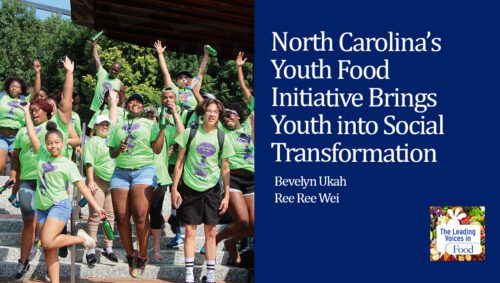 E165: North Carolina Youth Food Initiative Brings Young People into Social Transformation
E165: North Carolina Youth Food Initiative Brings Young People into Social Transformation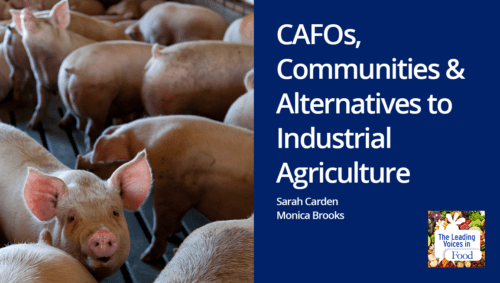 E158: CAFOs, Communities, and Alternatives to Industrial Agriculture
E158: CAFOs, Communities, and Alternatives to Industrial Agriculture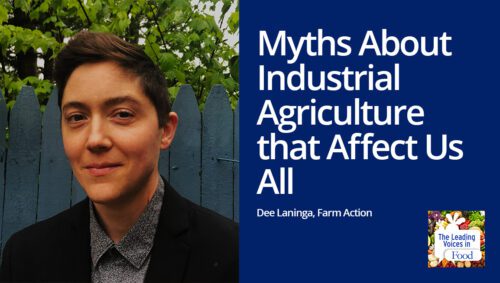 E156: Myths About Industrial Agriculture That Affect Us All
E156: Myths About Industrial Agriculture That Affect Us All E147: Farmer-scientist Measures the Real Benefits of Regenerative Agriculture
E147: Farmer-scientist Measures the Real Benefits of Regenerative Agriculture